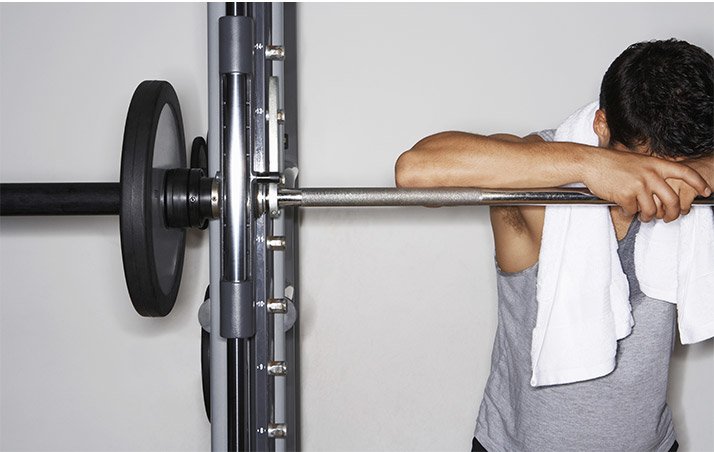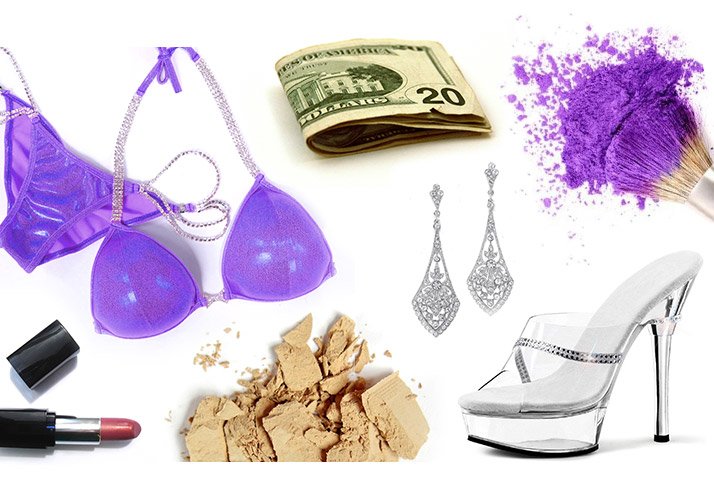
7 Competition Realities Veterans Don't Tell Rookies
It's time to brush off the sugarcoating and unveil the truth. Here's what you should know before signing up for the fitness-competition stage.
Over the last 3-4 months, there has been a shift in the world of fitness competitions—specifically bikini and figure. Physique competitions that were once less popular—particularly on the female side—have quickly transitioned to the mainstream. In my native Minnesota, I've noticed that National Physique Committee (NPC) and North American Natural Bodybuilding Federation (NANBF) shows that previously had 5-10 participants per height class have doubled—and in some cases, tripled—in attendance.
This is no isolated incident either. From photographers to judges, industry vets have taken notice of the upward trend. This means more fitness aficionados and gym fans are throwing their hat into the ring and looking into making their onstage debut.
I often receive emails and have conversations with people where I'm asked what it takes to get started. The truth of the matter is that there are many realities to competing that experienced veterans may not feel would benefit "new kids" coming onto the stage. It's a side of competing that's often softened so newbies aren't scared off. It's not that people can't do anything they set their mind to; it's more that there are consequences and aspects to competing that may surprise some people.
Well, I'm not one to sugarcoat things. Here is the uncensored truth about the sacrifices competing takes and the pitfalls you'll have to sidestep along the way if you want to come out on top of the competition circuit.
Beware of Bad Coaches
When it comes to finding a coach, do your research. I can't tell you how many new people have shown me absolutely asinine meal and training plans—700 calories and two hours of cardio a day? Um, sure, that sounds healthy. Keeping your sodium almost nonexistent when you're four months out from your show? No thanks.
Look, I'm glad that you're boyfriend's cousin's BFF's neighbor across the street is a trainer. That's neat. That doesn't mean he's qualified to put your meal plan together. Seriously, ask around. See how long they've been in the industry, and talk to previous clients before you make any decisions.

Take the time to find a person you trust who has a good reputation. Look for people with reputable training certifications and proven track records, both in their own physiques and in their athletes. Ask questions and get references. Emphasize your goals and the routes you're willing to take to get there. Are you willing to wake up early for fasted cardio or work out late even after long days at the office? How far are you willing to go to get the results you want?
When looking for a coach, ask for sample diets, and find out how rigid their training programs are. A good coach will have flexibility, understanding, and different techniques to help you attain your goals. Your coach should not be running a dictatorship. If you feel like something is legitimately wrong, you should be able to have a conversation about it and get an actual explanation that makes sense. Coaching is a partnership, and you should come to a solution together.
Get Ready to Kiss Your Social Life Goodbye
As much as I wish I could say that competing won't interfere with your day-to-day life, it will. On top of working, many people have kids. Now toss in days filled with rigid training, measuring out your food, and calorie counting. A solid competition plan is going to have you booked out, and your wiggle room becomes more limited as your event nears.
Your diet is going to have to be airtight. Cheats may be allowed in the beginning, but eventually they'll get yanked. You're a guinea pig to your nutrition plan for your first few competition preps. Needless to say, this makes going to social events a test of will. Treats brought into work by colleagues will test your resolve. How strong is your willpower? How easily can you say no?
Be prepared to carry Tupperware meals to parties and social events and to wake early on weekends to meet your caloric needs. Also realize that just because you become comfortable with the process, others may not. Co-workers might raise an eyebrow at your foul-smelling reheated tilapia, your family may not get it, and friends might fall away. The key is to believe in your goals and prepare yourself to answer the same questions a hundred times. Remember, people don't have to understand what you're doing or why you're doing it. Only you do.
As your schedule fills up with show prep, your phone may stop ringing. In truth, a lot of people may cut and run due to the discomfort of seeing you tighten your self-discipline. You might also miss out on social events entirely as you try to find a balance between contest prep and real life. Happy hours, birthday parties, and going out with friends isn't quite the same when you're stuck with water, unsweetened iced tea, and a limited diet plan. If you're not content snacking on veggies, nuts, and fruit when you're out and about, I highly recommend not putting yourself in situations where you're likely to cave or backtrack on your goals. Admit your own vulnerabilities and plan ahead to stay on track.
Ladies: Start Saving Your Money Now
It may not be as much of an issue for the men—tans and standard men's posing suits aren't as pricey— but ladies, take notice: Shows will cost you a pretty penny. I often refer to competing as the women's equivalent to football or hockey equipment. This stuff adds up fast!

The sticker shock is eye-opening to new competitors. We're talking about all the food you eat, your gym dues, registering for your organization, registering for your specific event or events, your competition suit (and sportswear depending on your division and organization), your tan, shoes, training, posing coaching, and hair and makeup. Not to mention that if you go out of state, you'll need to pay for airfare and a hotel.
Wanna do a shoot? Awesome! Tack on another $300-$3,000 depending on who you're shooting with. The point is, competing is a huge investment. If you can barely afford your rent, hold off on getting onstage until you're in a more stable financial position, or you're going to be miserable and stressed out. Just getting on the local stage cost $300-$500. Hopping a plane to your desired location? Be prepared to spend closer to $1,000-$2,000.
Don't believe me? The 2013 Arnold cost me close to $5,000 when I tallied everything from hair and makeup to airfare.
Understand You'll Undergo a Personal Journey
At the start of your journey, you may think you're just working on your body, but getting ready to take the stage truly challenges you physically, emotionally, mentally, and spiritually. You'll find new and vulnerable parts of yourself, but you'll also uncover strength and discipline you didn't know you had.
Show prep is an incredibly vulnerable process and will involve a lot of trust between you and your coach. You will have no choice but to have faith in the process and the person you hired to get you "stage lean" in the first place. You will have high highs and low lows, and they will be cyclical.
Ever burst into tears over food or a workout? No? Well, don't be surprised when it happens. Shows churn up a significant amount of emotion that often takes people by surprise! Competitions challenge you to your core. Insecurity, fear, doubt, self-belief, self-esteem, and vulnerability are all emotions you'll face daily. Spread that out over 3-4 months, and it's emotionally daunting for anyone, let alone a newcomer to the fitness circuit.
You Will Feel Like a Crazy Person the Last Few Weeks
I don't tell anyone this until they're already there: The last few weeks leading up to a competition, you'll feel bipolar. It's perfectly normal to waver between "Yeah, I'm totally ready to get on stage!" to "Oh my god, I'll never be ready in time!" on a daily or even hourly basis. During your first show prep, you'll feel especially scattered because you have no basis for comparison.

I never tell new people, "Oh man, you're going to feel horribly insecure and all over the place that last month, but after you've done one competition it gets easier!" If I did, why would they ever want to get on the stage? While it sounds terrible, it's the truth—and everyone goes through it. It's rare even for experienced athletes and competitors to hit the stage looking perfect. Most people, no matter how phenomenal they look, are not completely satisfied. The beauty of this sport is that you're always striving to improve and bring your best physique to the stage. Always.
On Show Day, Leave Your Ego at Home
I see this happen time and time again, no matter the experience level of competitors. People get overconfident. It's not that they don't look amazing, but no one should waltz in expecting to win their first show; very few people do. And the ones that do then go on to feel like a failure if they compete and don't place as highly as they did before. A vicious cycle can develop.
Competing is supposed to be fun. Winning can be a blast. I've seen awesome people win shows and earn pro cards, and I adore seeing my friends succeed. On the flip side, I've seen awesome people beat themselves into a pulp emotionally because they expected a trophy and didn't get one. Your placement and being handed a trophy has nothing to do with your value. Compete for you. Do it because it's a challenge and because it's fun. The moment you start letting placements dictate your self-esteem, all the fun gets sucked out of the process.
Go Go Gadget Body Dysmorphia!
I don't share this with new people very often, but it's true: once you see and feel yourself contest lean, you might have a distorted body image. We logically understand we can't be stripped of water and carb-depleted all the time, but that doesn't stop us from wanting the stage body.
I have a secret: Almost no one stays contest lean all the time. Very, very few people do or can. Bear in mind that many of the athletes that you see gracing the stage are not natural, and certain things people take make it easier to stay lean all the time. It's unrealistic.

I'm not saying you're going to put on 25 pounds, but don't beat yourself up when you gain 8-10 pounds post-show. It's just life: A week out from your show you'll think, "I'd be happy just being able to eat fruit whenever I want!" Until you taste a doughnut or ice cream—then you're screwed. The moment refined sugar is added back into your system, the idea of being excited about fruit goes out the window.
Look, have your cheats after a show, then bring some moderation back in the mix. It's not that difficult to keep yourself from going overboard. You're human. We love comfort food, and we love being social with family and friends. That's okay! Avoiding the deep end is fairly easy. Just remember this: Everyone regains some weight after a show. It's normal. And frankly, your body needs it. Learn to love yourself at any size and you'll be golden!

